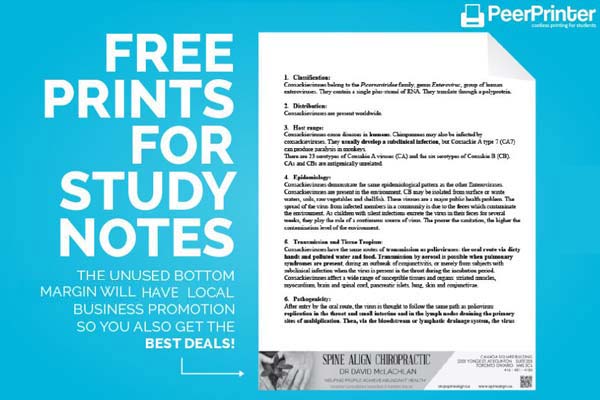
Spotlight on Startups: students launch company without waiting for entrepreneurship course to finish
Published: April 11, 2014
Benjamin Seo-Yong Park couldn’t wait for the exam. Park, a fourth-year French Language Teaching student taking an undergraduate course in entrepreneurship at The Impact Centre at U of T, recently conceived of and launched an already growing startup called PeerPrinter.
The company sells ad space on free student printing, easing printing costs for students and offering a new way for businesses to connect with a university market. And Park and his team rolled it out even before the semester-long IMC200 class came to a close.
“Many people talk, many people conceive of ideas. Not many act on it,” said Professor Cynthia Goh, director of the Impact Centre. “These young students had an idea of what they could do, and they went ahead and did it.”
“I'm impressed with how they've thought of the details. For example, they thought about what intellectual property they may have, and even wrote a patent for it — because we had discussed it in class!”
Goh said the IMC200 class Park is enrolled in is a primer on startups for students in the humanities, social sciences or sciences who have no, or very little, background in entrepreneurship. Despite that, Park and his co-founder, U of T Cell Systems Biology alumnus Daniel Taewoo No, were able to develop and launch an actual business, adding six new members to their team from a range of Toronto universities and colleges — all after getting acquainted with just the basics in class.
“In the very beginning, we went out and did a survey to 600 students in U of T and 92 per cent of students showed that they were in favour of using PeerPrinter service once it's launched,” said Park. “We realized our business model had solid ground, then we started putting things in action.”
PeerPrinter delivers the printed lecture notes (within a set weekly limit) before class directly to students at the University of Toronto. They say they plan to expand service to students at Ryerson and to introduce printing kiosks at some of the U of T colleges.
Park spoke with U of T News about how PeerPrinter transformed from class notes to small business.
How did the idea come about to launch PeerPrinter?
Looking around in our classes we saw many students with printed copies of the lectures’ PowerPoint slides despite our paperless-oriented generation. It seemed this was the preferred study method, especially for science classes with diagrams. Printing is a hidden cost of attending university, as many students have to own and maintain a printer with continuous supply of papers and toners or pay 10-15 cents per page to print at the university libraries. An average lecture is around 20 pages, so over the course of a semester this presents a huge extra financial stress placed on student budgets. We thought we could remedy that by making class notes a simple advertising medium.
How did taking the IMC200 course help inspire PeerPrinter?
Professor Cynthia Goh's passion for entrepreneurism is well known. I had heard the class was excellent and having no real business experience, a good opportunity to learn about business and startups. The class really helped us come up with a polished business plan, as well as many other resources for creating valid business models and many do’s and don’ts of small business.
Specifically, what skills or ideas did you learn in the IMC200 course that helped you launch PeerPrinter?
Professor Goh’s class really facilitated the development of our business plan and model. She gave us plenty of ideas about where to access financial and mentorship resources to launch PeerPrinter after we completed our business plan. The class also taught us to develop professional business cards and etiquette in business networking settings, to create our own video ads (which we currently use in our website). We gained information on intellectual property which helped us to submit our company's patent in North America, negotiations skills which I applied while purchasing a production-level printer and elevator pitch and product development skills.
What's been the greatest challenge in your first stages of launch and how did you overcome it?
The amount of flexibility required to launch a start-up. You can think you have a solid model, but until you’re actually running and trying to get clients to buy into your idea, you really don’t know. It’s taken a lot of patience (and stress!) to find the most sustainable and effective method. We overcame many of these obstacles because of the flexibility in our model and our team.
What's your hope for the future of PeerPrinter?
The future of PeerPrinter quite literally falls into the student’s laps; if there is a large interest from the student population, then there is no limit to how far we can go. We would like to provide every student who needs it with the opportunity for free-printing. We also have plans to build more creative innovations and useful services that will help students and staff in universities and colleges.
As for being an entrepreneur, it’s stressful, but it’s very exciting. The flow of new ideas seems to amplify once you begin solving your own business problems.
———————————————————————————————————————————————
About the Spotlight on Startups series
Spotlight on Startups profiles the many entrepreneurial efforts growing from the hundreds of companies spun out from research and connections sparking every day at the University of Toronto:
U of T hosts more than 50 enterprise-fostering courses, programs, labs, clubs, contests and speaker series across its faculties, departments and campuses — and then there are all the innovations developing in informal settings. U of T ranks No. 1 in North America for number of startups launched. And its roster of spin-off companies driving innovation in Toronto and around the world continues to grow.
Brianna Goldberg is a writer with University Relations at the University of Toronto.



